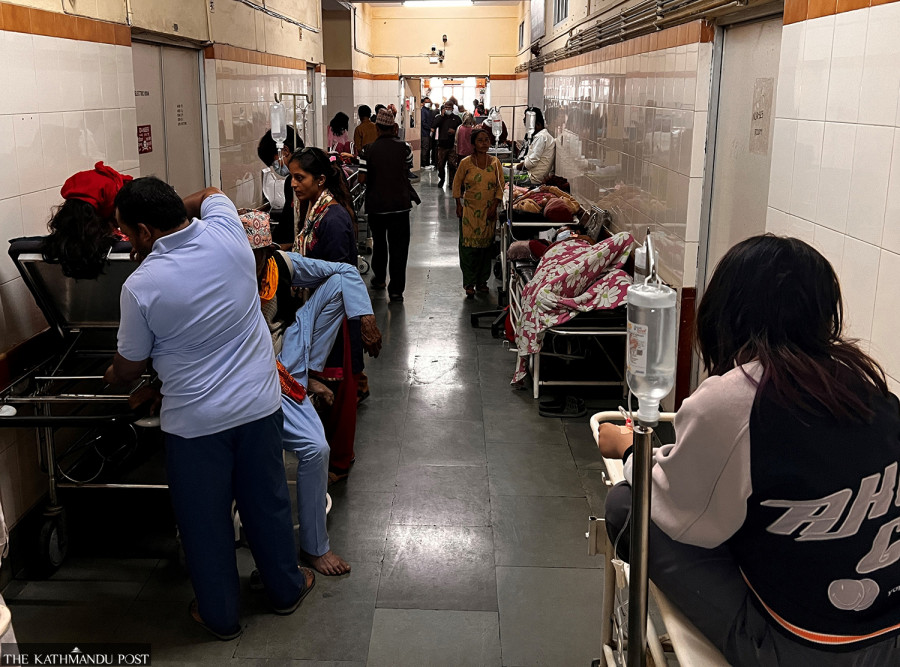
Rudra Limbu, a chronic kidney patient from Urlabari in Morang, visited the BP Koirala Institute of Health Sciences (BPKIHS) in Dharan for treatment last Monday. The consulting doctor at the emergency unit recommended admission to the Chronic Kidney Disease department to start his treatment immediately.
Limbu waited for three days to get admitted to the hospital.
BPKIHS has been struggling to provide quality services to patients due to a shortage of beds and lack of skilled manpower. Hundreds of patients like Limbu have been either made to wait to get admitted to the hospital or return without receiving treatment.
“Patients have to wait for hours to even get time with the consultant doctors at the emergency unit. If you have to get admitted then you have to deal with the shortage of beds. I slept on the floor in the corridor outside the emergency unit for three days waiting for a bed to be available,” said Limbu.
According to Dr Gyanendra Malla, professor and head of general practice and emergency medicine at the hospital, the emergency ward has only 110 beds which receive at least 250 patients per day. “On a daily basis, around 3,500 to 4,000 patients visit the hospital out of which about 250 patients visit the emergency unit. Seventy percent of those who visit the hospital do not need hospitalisation. The lack of beds in almost all the departments has posed a challenge for the medical staff and the patients,” said Malla.
Orthopaedics, medicine, surgery, pulmonary, gastro, cardio, and neuro units do not have sufficient beds and are forced to sleep on the hospital floor, says Malla. Nearly 80 surgeries are carried out in the hospital in 24 hours.
According to the officials of the hospital, only three weeks ago, the institute advertised for the post of 50 Senior Resident doctors with MD degrees. Only nine candidates applied for the job while only three showed up for the interview. The hospital has 768 posts of doctors but only 361 have been filled.
The hospital has posts for 958 nurses but there are currently only 696 nurses.
“We advertised for the posts of doctors but sadly there weren’t many applicants. It could be because the remuneration is low at government hospitals compared to private ones. At BPKIHS, the maximum salary of a specialist doctor is Rs100,000. Students spend a lot to pursue medicine so they expect good returns,” said Malla.
According to the hospital data, around 3,226 staffers—medical, administrative and support staff—are required to run the hospital effectively, but currently, there are just 1,880 staffers at the hospital. “The institute has been producing skilled and specialist doctors and technicians. The Medical Education Act states that students who study on government scholarships must serve in government hospitals for two years. But the government sends out scholarship students to other public hospitals before meeting the BPKIHS’s requirement,” said Dr Jagat Narayan Prasad, director of the institution.
“BPKIHS is a large institution that requires human resources in equally large numbers,” says Prasad. “If the ministry continues to take away our doctors, it will be a long time before the hospital meets its human resource requirements,” he said.
According to Dr Chudamani Pokhrel, BPKIHS co-spokesperson, the hospital wrote to the Ministry of Health on September 18 requesting permission to hire 17 specialist doctors who had passed out from the institution, but the ministry did not take their request.
“The ministry does not allow us to keep our own doctors. It is not unlawful for the ministry to do so, but they should also understand the pressure under which BPKIHS is performing. The shortage of manpower has affected overall services at the hospital,” said Pokhrel. “There is an urgent need for senior resident doctors and lecturers.”
The hospital is in need of an upgrade to accommodate the growing number of patients, says Prasad, but the Ministry of Health and Population has been ignoring their request.
“People from across the province and elsewhere come to BPKIHS seeking services. We have 1,050 beds in total and we need to add 1,000 more,” said Prasad. “We have 110 beds in the emergency unit and we need at least 100 more. The responsibility for the upgrade falls under the Ministry of Health and Population, they have not heeded our requests.”
According to Prasad, the construction of the Maternity and Child Health (MCH) ward, which will add 400 beds, is only 65 percent complete. “Upgrade of the cardio, trauma, organ transplant and heart surgery departments have been on hold because the ministry failed to allocate a budget on time.”












